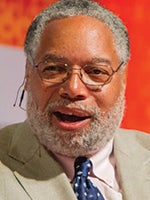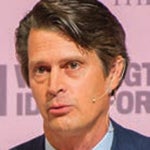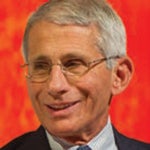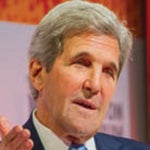For the eighth year, the nation’s thought leaders, elected officials, experts, and innovators arrived at the Washington Ideas Forum for tough and dynamic conversations with moderators from the Institute’s partners at The Atlantic. From the heart of the nation’s capital, the Forum tackled politics, race, justice, education, technology, and more. This year, the Forum spanned a full week, with events in venues across DC. In addition to the rich discussions, the invited audience could watch the presidential debate with Beltway insiders, catch a film screening, or enjoy networking nights with the nation’s top minds. Visit the Washington Ideas Week page to learn more.
Photography by Max Taylor
 “This museum is a complement to other Smithsonian museums, which give you different portals into what it means to be an American. It is this deep, rich look at African American culture and history—allowing America to confront its tortured racial past. But it’s also saying: ‘This is the story of us all. This is the story that profoundly shaped our notions of freedom and citizenship.’ Candidly, it claims its Americanism.”
“This museum is a complement to other Smithsonian museums, which give you different portals into what it means to be an American. It is this deep, rich look at African American culture and history—allowing America to confront its tortured racial past. But it’s also saying: ‘This is the story of us all. This is the story that profoundly shaped our notions of freedom and citizenship.’ Candidly, it claims its Americanism.”
—Lonnie Bunch, founding director of the National Museum of African American History and Culture
 “It’s not just that you shoot a man who is unarmed; it’s that you handcuff him when he’s dying. There’s something about it that is so unforgivably inhumane. One of the terrible things about race in this country is that there’s a sense in which blackness isn’t really seen as fully human, and that’s why these things are happening. That’s why a man who is dying is handcuffed. That’s why a boy who is dead is left on the street for hours. It makes me wonder: What has happened to the part of us that is good?”
“It’s not just that you shoot a man who is unarmed; it’s that you handcuff him when he’s dying. There’s something about it that is so unforgivably inhumane. One of the terrible things about race in this country is that there’s a sense in which blackness isn’t really seen as fully human, and that’s why these things are happening. That’s why a man who is dying is handcuffed. That’s why a boy who is dead is left on the street for hours. It makes me wonder: What has happened to the part of us that is good?”
—Chimamanda Ngozi Adichie, author of Americanah and Half of a Yellow Sun among other works
 “It’s a new frontier. You’re putting a digital reality onto the physical world. You’re putting digital things into real space. It changes human behavior. People actually change where they go. They change the direction that they go to work in the morning. It causes crowds to gather in certain places. We leverage that addictiveness and fun of games in an app that leads you outside and that could take place in the park and throughout the city.”
“It’s a new frontier. You’re putting a digital reality onto the physical world. You’re putting digital things into real space. It changes human behavior. People actually change where they go. They change the direction that they go to work in the morning. It causes crowds to gather in certain places. We leverage that addictiveness and fun of games in an app that leads you outside and that could take place in the park and throughout the city.”
—John Hanke, the CEO of Niantic, which created Pokémon Go
 “If you look at the dating sites that came before Bumble, they marketed to the desperate, to the people who were lonely and hopeless. They preyed on that. When someone used it, they felt this sense of shame and embarrassment. Apps like Bumble are a benefit to society, giving you access to people who you might not otherwise have the chance to connect with. We have shortcuts in everything that we do. I would never advise anybody to take a shortcut to love, but to an introduction, why not?”
“If you look at the dating sites that came before Bumble, they marketed to the desperate, to the people who were lonely and hopeless. They preyed on that. When someone used it, they felt this sense of shame and embarrassment. Apps like Bumble are a benefit to society, giving you access to people who you might not otherwise have the chance to connect with. We have shortcuts in everything that we do. I would never advise anybody to take a shortcut to love, but to an introduction, why not?”
—Whitney Wolfe, CEO of Bumble
 “This idea of a bringing all the countries in Europe together—the European project—really is a visionary idea. But they made a big mistake. They thought that by having a single currency, they would move further along toward that idea, and they pushed economic integration before they had the political institutions to make it work and before there was enough solidarity to create those political institutions. And the consequences have been very, very serious.”
“This idea of a bringing all the countries in Europe together—the European project—really is a visionary idea. But they made a big mistake. They thought that by having a single currency, they would move further along toward that idea, and they pushed economic integration before they had the political institutions to make it work and before there was enough solidarity to create those political institutions. And the consequences have been very, very serious.”
—Joe Stiglitz, Nobel Prize–winning economist
 “The United States has a tendency of using Pakistan whenever it’s required and then ditching it. This is the perception of the people of Pakistan. I am pro-Pakistan only. I look after Pakistan’s interests. All my decisions are in the interest of Pakistan. But within that, I believe the interests of the United States are very much in the interest of Pakistan. So we have to have good relations with the United States.”
“The United States has a tendency of using Pakistan whenever it’s required and then ditching it. This is the perception of the people of Pakistan. I am pro-Pakistan only. I look after Pakistan’s interests. All my decisions are in the interest of Pakistan. But within that, I believe the interests of the United States are very much in the interest of Pakistan. So we have to have good relations with the United States.”
—Pervez Musharraf, former president of Pakistan
 “If you take Zika in a vacuum apart from its effects on pregnant women, it’s a relatively mild disease: 80 percent of people don’t know that they’re infected. They’re completely without symptoms. But when you add to it the issue of pregnant women, it can be overwhelmingly devastating. Florida is like the Grand Central Station of travelers that come from the global south. It has the right climate, mosquitos, and perfect storm to have local transmission.”
“If you take Zika in a vacuum apart from its effects on pregnant women, it’s a relatively mild disease: 80 percent of people don’t know that they’re infected. They’re completely without symptoms. But when you add to it the issue of pregnant women, it can be overwhelmingly devastating. Florida is like the Grand Central Station of travelers that come from the global south. It has the right climate, mosquitos, and perfect storm to have local transmission.”
—Anthony Fauci, director of the National Institute of Allergy and Infectious Diseases
 “People don’t want to know anything about their food. People don’t want to know something died to make that burger you’re eating. Someone picked that piece of fruit for your salad. Most of the responsibility is on restaurants. But consumers should understand that food should be more expensive—for the farmer, for the environment, for the many costs that are just hidden.”
“People don’t want to know anything about their food. People don’t want to know something died to make that burger you’re eating. Someone picked that piece of fruit for your salad. Most of the responsibility is on restaurants. But consumers should understand that food should be more expensive—for the farmer, for the environment, for the many costs that are just hidden.”
—David Chang, chef and founder of Momofuku
 “I am an eternal optimist, and that’s what makes me a civil rights lawyer. I don’t think you can do civil rights work and not be optimistic about the fact that this country has had an imperfect yet inexorable march toward justice and progress.”
“I am an eternal optimist, and that’s what makes me a civil rights lawyer. I don’t think you can do civil rights work and not be optimistic about the fact that this country has had an imperfect yet inexorable march toward justice and progress.”
—Vanita Gupta, principal deputy assistant attorney general and head of the Civil Rights Division at the US Department of Justice
 “With a personal-car ownership model, our vehicles sit idle about 95 percent of the time. They’re only active about 5 percent of the time. That’s a massive capital inefficiency,
“With a personal-car ownership model, our vehicles sit idle about 95 percent of the time. They’re only active about 5 percent of the time. That’s a massive capital inefficiency,
and we can do much better as a society.”
—John Krafcik, CEO of the Self-Driving Car Project
 “The relationship between the car and individual is going to evolve. Driverless cars are going to enable disabled citizens, the elderly, to have entirely new ways to get around. Driverless cars will facilitate an even stronger push for ride-sharing culture. Driverless technology will extend into transit, into trucking. It’s going to be one of the most dynamic transformations we have ever seen: 94 percent of the crashes that occur are due to human factors. You will see substantial declines in the number of crashes as a result of autonomous technology.”
“The relationship between the car and individual is going to evolve. Driverless cars are going to enable disabled citizens, the elderly, to have entirely new ways to get around. Driverless cars will facilitate an even stronger push for ride-sharing culture. Driverless technology will extend into transit, into trucking. It’s going to be one of the most dynamic transformations we have ever seen: 94 percent of the crashes that occur are due to human factors. You will see substantial declines in the number of crashes as a result of autonomous technology.”
—Anthony Foxx, US secretary of transportation
 “I make no apology for trying to reach out and find out if there is a way to achieve the political settlement that everybody agrees is the only way to solve the problem of Syria. You find people constantly saying that there is no military solution. Well, if there is no military solution, what is the political solution? It’s the job of the secretary of state and diplomats to try and do that, as tough as it may be. And it is tough.”
“I make no apology for trying to reach out and find out if there is a way to achieve the political settlement that everybody agrees is the only way to solve the problem of Syria. You find people constantly saying that there is no military solution. Well, if there is no military solution, what is the political solution? It’s the job of the secretary of state and diplomats to try and do that, as tough as it may be. And it is tough.”
—John Kerry, US secretary of state
 “This idea that Washington is broken, and that the world is set up more against you than for you in certain demographics, is very real. Trump has tapped into a lot of voter discontent. And to the extent that one represents the status quo, people are ready to abandon you, and I can understand that. But to be replaced with what? If you don’t like our current foreign policy, what is Trump going to do? Saying that Putin is our friend doesn’t make it better.”
“This idea that Washington is broken, and that the world is set up more against you than for you in certain demographics, is very real. Trump has tapped into a lot of voter discontent. And to the extent that one represents the status quo, people are ready to abandon you, and I can understand that. But to be replaced with what? If you don’t like our current foreign policy, what is Trump going to do? Saying that Putin is our friend doesn’t make it better.”
—Lindsey Graham, US senator from South Carolina
 “Obamacare is imploding. It’s in what actuaries call ‘a debt spiral.’ We propose a very comprehensive alternative, including the entitlement reforms necessary to avoid a debt crisis in the future.”
“Obamacare is imploding. It’s in what actuaries call ‘a debt spiral.’ We propose a very comprehensive alternative, including the entitlement reforms necessary to avoid a debt crisis in the future.”
—Paul Ryan, speaker of the US House of Representatives

